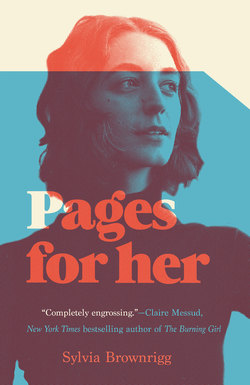Читать книгу Pages For Her - Sylvia Brownrigg - Страница 12
На сайте Литреса книга снята с продажи.
4
ОглавлениеCharles would object.
Flannery saw this from the first moment in Bean There, Done That, the knowledge hitting her almost simultaneously to her reading the email invitation.
Flannery’s husband – and that too seemed an improbable word to attach to herself, ‘husband’, something Flannery Jansen had never expected to have, or to hold – was an artist. Charles Marshall. His work was widely known, out in the world and close to home, too, where an installation of his enlivened a recently revamped terminal at the San Francisco airport. Charles Marshall (never Charlie or Chuck, unless you wanted to irritate him) was a big man: big appetites, and the girth that went with them; big creations, and big emotions, not all of them positive. When tall, broad, goateed Charles was in a benevolent mood, he was loud, funny, warm, and generous, a showman, a storyteller, a circus master. When he was angry, the windows rattled and the lights flickered, and small animals retreated to their warrens until the rage had spent itself, and the city’s workers had cleared the debris from the streets.
Charles Marshall did not, Flannery knew, think of himself as a man who would object to his wife’s traveling to the East Coast for a writers’ conference. An all women writers’ conference. Certainly not. How could he mind? He was an artist too, and progressive, a good husband and a doting father who would delight in having a few days on his own to take care of his sweet little muffin, his six-year-old daughter. He was not any sort of ogre. He was a good-natured, cooperative, supportive man.
‘That’s a bad time for me.’ Charles shook his head, though his words were somewhat garbled by a mouthful of spanakopita. Flannery had decided to run the travel idea by Charles right away, and, as a mood enhancer, she had cooked something interesting. Occasionally, Flannery took to kitchen consolations. Making spanakopita was a kind of inside joke (for a party of one), having had the Greek salad days of her college years so vividly in mind since that morning cafe correspondence. Willa asked for more water as she tried to make the fork do its work on the salty feta and filo dough. Charles swallowed, then repeated more clearly, ‘October’s going to be a bad time.’
More than usual? Flannery wondered, as she got up to refill her daughter’s water glass. Charles could sit still through half a dozen such requests without apparently hearing them. ‘Why?’ Flannery asked levelly.
‘One.’ Charles stuck a blunt thumb up in front of him, like a maverick politician. ‘I’ve got to finish that piece that’s going to Detroit. They want it by Thanksgiving, and the woman I’m dealing with there is a pain in the ass. Two.’ Up went the index finger, and he tilted his hand, making an L. ‘That kid Lowell, Michael’s son, is coming to start “helping” me in the studio in a few weeks, but you know what that means, there are bound to be fuck-ups at the beginning. He’ll probably set the place on fire or gouge someone’s eye out. Three . . .’
But Flannery chose not to look at her husband’s middle finger as it prepared to help him enumerate a third difficulty. Instead, she half turned in her chair to face her daughter across the table, and smiled with a seizure of love into that dear, concentrating, squirrel-cheeked face.
